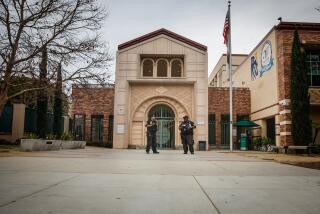Study Finds Youth Unlikely to Report Sex Abuse by Teachers : Schools: Co-author of four-year report says of 225 cases involving students, only 7.5% of the allegations were found to be false.
- Share via
It’s far more common for students to fail to report being sexually abused by school personnel than for a teacher to be wrongly accused, according to a study published last month in the Phi Delta Kappan education journal.
The four-year study of 225 cases in which students were sexually abused by teachers or other school employees concluded that only 7.5% of such allegations turned out to be false. At the same time, the study found, some of those apparently false allegations involved incorrect determinations by school officials that the incidents were not serious enough to be considered sexual abuse.
“The larger problem is not that teachers are being falsely accused, but rather that students are being sexually abused and are not reporting it,” said Charol Shakeshaft, who chairs the Department of Administration and Policy Studies for Hofstra University in Hempstead, N.Y.
According to most professional estimates, a mere 2% to 6% of sexual abuse cases are reported to an official, said Shakeshaft, who co-authored the study with Audrey Cohan, an adjunct assistant professor at Hofstra.
The study also found that not only are teachers who sexually abuse students often among the best and most popular educators, but the children they prey upon tend to be some of the most vulnerable.
“The kids were already on the edge,” Shakeshaft said in an interview.
A disproportionate number of accusations were leveled against staff members who worked with students in extracurricular activities or who had frequent, one-to-one contact with students, such as coaches or drama and music teachers.
The study found that 22% of the victims were male and 78% were female. Boys were more likely to be sexually abused in elementary school; girls were abused at all grade levels.
Two types of abusers were identified in the study: pedophiles, who are sexually attracted to children and work in schools so they can be close to them; and school personnel, who possess bad judgment and regard their actions as either harmless or romantic.
In the cases involving pedophiles, Shakeshaft said, the abusers adopted strategies to find sexual partners. They not only sought out vulnerable and needy kids, she said, but they would carefully weigh whether the potential victims would tell.
“Pedophiles almost always tended to be people who spent enormous amounts of time with students,” Shakeshaft said. “That’s why parents liked them and that’s why kids liked them too.”
The study also found that communities tended to rally around an accused teacher. School officials were often cast as “bad guys” for bringing charges against a popular instructor, and parents would demand an end to what they perceived as persecution.
In one case, a school superintendent in an unidentified city was forced to face a crowd of angry parents who accused her of being “out to get the teacher,” Shakeshaft and Cohan recounted in the Phi Delta Kappan, a widely read trade journal.
“You are attacking me because I heard allegations of sexual abuse of a student by a teacher and I am doing something about it,” the superintendent told the crowd. “What kind of leader do you want? Would you want me to do nothing? I won’t do that.”
Sometimes, parents never quit believing in the teachers, even after they had been convicted in a court of law, according to the study.
More to Read
Sign up for Essential California
The most important California stories and recommendations in your inbox every morning.
You may occasionally receive promotional content from the Los Angeles Times.













